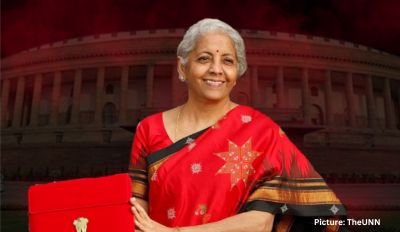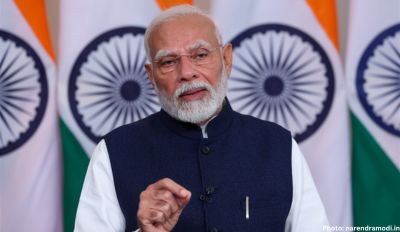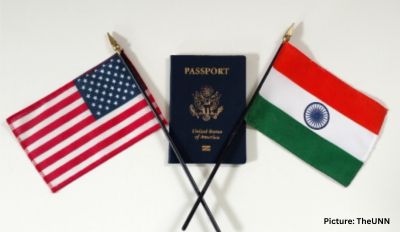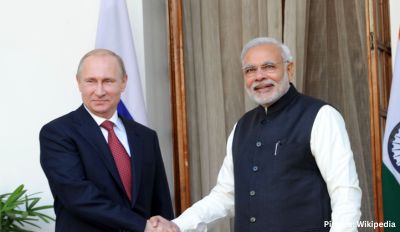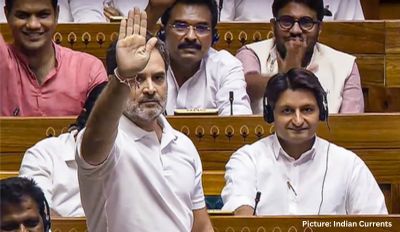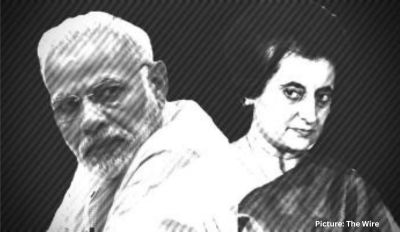Modi Is Rewriting India’s National Narrative. The prime minister’s annual Independence Day speech reflected how far political discourse has fallen in New Delhi.
India celebrated the 75th anniversary of its independence this week. Unlike prior revolutions, India’s split from the British Empire came about through a political movement committed to nonviolence. The Indian National Congress, led by Mahatma Gandhi, organized peaceful demonstrations on an unprecedented scale, and the mighty British Empire ultimately capitulated, encouraging anticolonial movements around the world. Within a generation, countries in Asia, Africa, and the Caribbean also achieved independence, ending a long and grotesque epoch of European imperialism.
India has long commemorated this watershed moment on Aug. 15, headlined by the prime minister’s speech on the ramparts of the Red Fort in New Delhi. Leaders traditionally set aside partisan rivalries in these speeches, choosing to focus on apolitical themes: the importance of Gandhi and the nonviolence movement, the resilience of India’s democracy, and the importance of tolerance and inclusion. Indian Prime Minister Narendra Modi has mostly stuck to this formula, but this year’s speech signaled how Modi is trying to redefine what it means to be an Indian.
In his speech, Modi ticked the boxes by mentioning Gandhi and his commitment to inclusion, but he also departed from convention in important ways. First, he celebrated more than a dozen freedom fighters who had adopted a violent approach to independence. These freedom fighters operated independently of Gandhi and the Indian National Congress, undermining Gandhi and nonviolence within India’s independence movement. By highlighting them in the speech, Modi subtly pushed back against the conventional narrative and Gandhi’s central role in it.
Second, although Modi touched on inclusion when it comes to geography and gender, he avoided mentioning secularism or religious tolerance. Instead, he sought to define Indians as Hindus: “This is our legacy. How can we not be proud of this heritage? We are those people who see Shiva [a main Hindu deity] in every living being,” he said. “We are people who see the divine in the plants. We are the people who consider the rivers as mother. We are those people who see Shankar [another form of Shiva] in every stone.” For India, a country with 280 million non-Hindu citizens that has struggled with religious tensions since its founding, Modi’s religious interjections clearly signal a break from the past.
Expand your perspective with unlimited access.
Finally, Modi used the occasion to launch familiar jabs against the opposition Indian National Congress party while overlooking critical challenges facing the Indian state—including religious intolerance. He concluded his speech by slamming people who defend corruption and by condemning nepotism. But this was coded language that may sound like a threat to some Indian citizens: Modi and his ruling Bharatiya Janata Party (BJP) have weaponized charges of corruption and nepotism to go after political opponents and dissidents. Just days after Modi’s speech, his government conducted an anticorruption raid against Manish Sisodia, one of the main leaders of the opposition Aam Aadmi Party.
Modi’s Independence Day speech is emblematic of a larger change taking place under his rule, which has faced criticism for democratic backsliding—moving away from the very constitution that came shortly after its independence. The prime minister and the BJP are working to unshackle India from its liberal and secular moorings, advancing a new national identity that champions Hindu supremacy. This enterprise is in fact antithetical to the very foundations of Hinduism, which is an inherently pluralistic faith.
Modi’s BJP government is also undercutting India’s institutions in unprecedented ways. It has made a mockery of India’s rich tradition of civil liberties by charging activists and dissidents with crimes under colonial-era laws. One egregious example is the case of left-wing activists detained under the draconian Unlawful Activities (Prevention) Act for alleged links to Maoist groups and allegedly fomenting riots. One of the accused, lifelong Jesuit activist Rev. Stan Swamy, died in custody last year. Furthermore, Modi and the BJP have co-opted much of the media and important private sector actors. Journalists have faced intimidation and harassment; prominent nongovernmental organizations have been cut off from foreign funding while others can receive overseas money only into accounts with a government-owned bank.
Unfortunately, the most important lessons from the independence movement seem to be lost on India’s contemporary leaders, as shown by their approach to religious pluralism and democratic institutions. Although India’s leading revolutionaries were committed to nonviolence, tensions between Hindus and Muslims marred the independence movement. These tensions pulled the British Raj apart, and two new countries emerged in its place: India and Pakistan. This week also marks the anniversary of the Partition of India, which triggered one of the world’s worst humanitarian disasters as Hindus, Muslims, and Sikhs were forced to flee in different directions across the new border. A few months later, India and Pakistan went to war over the status of Jammu and Kashmir—a disagreement that still plagues the subcontinent.
In the face of these tensions, India and Pakistan’s leaders charted opposing courses. India’s leaders advanced a progressive and modern vision for their new country, eschewing a national Hindu religion in favor of a secular identity. They worked hard to minimize religious tensions by speaking against communal strife and promoting religious protections. When Gandhi was assassinated in 1948—for supposedly being a supplicant to the Muslim community—his political heirs continued to push for a liberal vision of India. Working with the opposition, they produced a constitution that enshrined a liberal and secular democracy that remains in force today.
On the other hand, Pakistan struggled. The country’s founder, Muhammad Ali Jinnah, led the Muslim League that split from the Indian National Congress. But he was rarely clear in his vision for Pakistan: There is some evidence that he wanted a secular state, but he also called for an Islamic republic. When Jinnah died in 1948, he left behind a political mess. Liaquat Ali Khan, Pakistan’s first prime minister, rejected amendments offered by the opposition in his own founding document, which became a precursor to the country’s 1956 constitution that gave Islam its pride of place in the project of Pakistan. By turning to communalism, Pakistan has suffered as political actors stir religious tensions to benefit their own ends. Without credible institutions or norms that allow political differences to be resolved, the country has not been able to maintain political order.
Modi’s speech reflects how he and the BJP appear to embrace some of these traits. By lionizing fringe actors from the independence movement—including those who exacerbated religious tensions—they are rewriting history to suit their own political agenda. They have undermined civil liberties and shown basic disregard for political opposition. Taking a page from Jinnah’s book, Modi has ensured that any substantive decision must come through him. Such a system may work in the short term, but what happens when Modi is no longer prime minister?
The contrast with then-Indian Prime Minister Jawaharlal Nehru’s epic “A Tryst With Destiny” speech, delivered on Aug. 14, 1947, couldn’t be starker. Nehru said he sought to “bring freedom and opportunity to the common man, to the peasants and workers of India; to fight poverty and ignorance and disease; to build up a prosperous, democratic, and progressive nation.” Most poignantly, he highlighted that India’s religious pluralism was integral to the newly founded country: “All of us, to whatever religion we may belong, are equally the children of India, with equal rights, privileges, and obligations.”
India’s Independence Day has traditionally provided an opportunity to reflect on the horrors of colonialism and the dangers of religious discord while also celebrating the vibrance of the country’s democracy. Modi’s speech this week reflects the departure that India’s contemporary leaders have made from these foundational values.
(Dinsha Mistree is a research fellow at the Hoover Institution and Stanford Law School. He also teaches in the international policy program at Stanford’s Freeman Spogli Institute for International Studies.
Sumit Ganguly is a columnist at Foreign Policy as well as a distinguished professor of political science and the Rabindranath Tagore chair in Indian cultures and civilizations at Indiana University Bloomington.)



